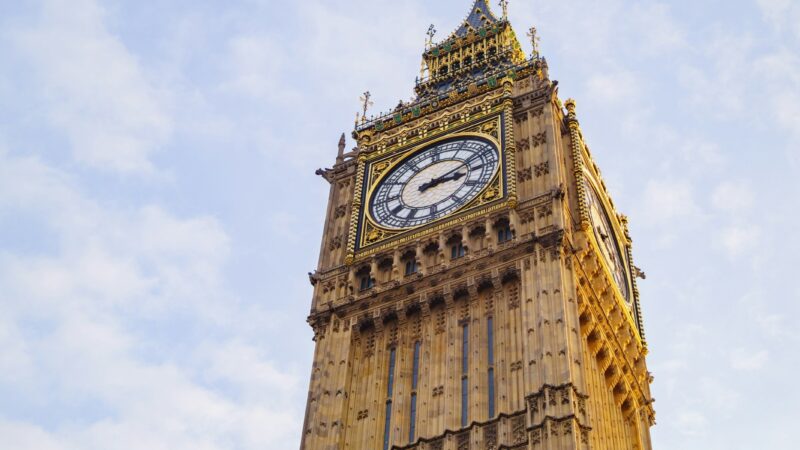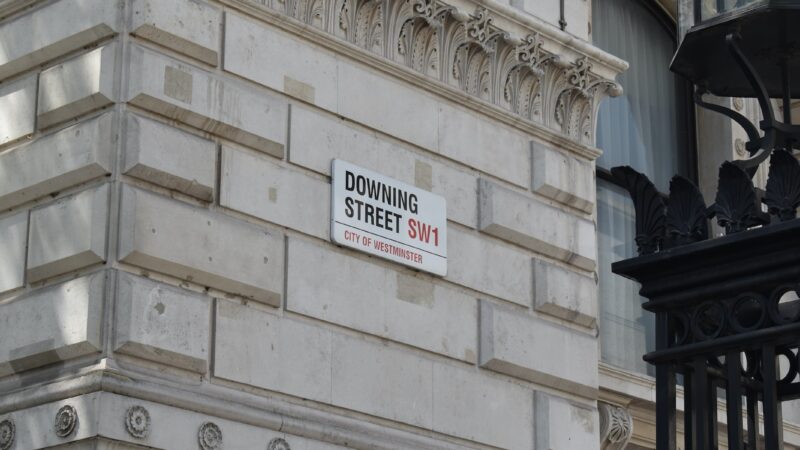Lord Cameron and the ‘New Majority’
A soft “What the hell” was heard from a reporter as former Prime Minister David Cameron stepped out of the car outside 10 Downing Street on Monday. The significance of the moment was quickly deduced as earlier Suella Braverman was sacked as Home Secretary and former Foreign Secretary James Cleverly had already walked through Britain’s most famous door: Cleverly becomes Home Secretary and Cameron, returning from political oblivion, replaces him as Foreign Secretary.
The appointment of Cameron, who is not an MP in the House of Commons and had to be elevated to a peerage by King Charles III to take office, is not only something no one saw coming. It is also a manifestation that Sunak might lead the Conservatives back in a direction that does not resonate with the voters.
A Look at the Political Realignment
A political realignment has been evident in British politics for just as long as in US politics. And it was the Conservatives’ realigned political approach, which emerged with the Brexit vote in 2016, that gave them a large majority in the 2019 general election. The landslide victory of Boris Johnson and the Conservatives was ultimately deliverable thanks to a large number of traditional Labour voters who switched in the hope of getting Brexit done.
It showed that there was a large voter base that the Conservatives could not only win over, but also lead them to large majorities. I will call this voter base the ‘New Majority’. This ‘New Majority’ can be sketched as conservative to very conservative when it comes to social issues while supporting economic positions traditionally held by left to center-left parties.
In conservative circles, the realignment towards this ‘New Majority’ is frequently viewed critically, especially by people who were thought leaders in the years before 2016. Primarily because they do not see this new orientation as being conservative, but rather interpret classical liberalism as being conservatism to advocate liberal social policy and economic libertarianism. This interpretation of conservative politics, however, is not only not conservative, but also a formula for guaranteed electoral defeat.
The Case for Conservatism
That this ‘New Majority’ should be the Conservatives’ target voter base and can be turned into a lasting majority is shown in the recent report “The Case for Conservatism” by Gavin Rice and Nick Timothy at Onward. As they put it:
“There is significant political advantage to be gained in a political party moving towards the real centre-ground. A more culturally conservative policy platform would bring the Tory Party nearer to Conservative voters’ social values. Mirroring this, an economic policy platform emphasising greater fairness and security, rather than deregulation and individualism, would bring it closer to the economic values of both Conservative and Labour voters.”
The report shows that there is a major disconnect between Conservative voters’ attitudes to economic and social issues and what the Conservatives are doing in terms of policy. In order to deliver policy that serves the electoral base, the report establishes 12 new core principles that lead to a “form of conservatism that takes long-established insights and principles and applies them to very modern challenges and problems. It argues for a conservatism that is popular and democratic, seeking to serve the whole nation.”
This includes a desire for a more active state, moving away from the old Conservative emphasis on limiting the state as much as possible. Working towards a fairer social contract by doing more for workers and families rather than pursue tax cuts that only benefit the few – an approach that was the beginning of the end for Liz Truss. And for the preservation of the environment, including more action on climate change.
On Suella Braverman
So where does David Cameron fit into this vision? He doesn’t!
Lord Cameron represents the pre-realignment form of the Conservatives, a form that makes policy not for those who find their desires reflected in the Rice and Timothy report but for the liberal elite who have benefited from previous Conservative governments.
Not only that, this appointment must also be seen in the context of the sacking of Suella Braverman. Braverman is a prominent figure who covers many of the concerns of voters who put their faith in the Tories – often for the first time – in 2019. Furthermore, for many people who felt that Rishi Sunak’s policies did not sufficiently address the concerns of the ‘New Majority’, she seemed a possible successor.
She spoke out against mass legal and illegal immigration. The Rice-Timothy report states “Currently, 63% of voters say that inward economic migration is too high” and “Polling conducted for Onward shows that there is a migration-sceptic majority in 75% of parliamentary constituencies.”
She spoke out against multiculturalism. Rice and Timothy’s report cites a Demos study which found that “71% of British adults say they believe that immigration has made the communities where migrants have settled more divided, reaching 78% in high-migration areas.”
And she spoke in defence of national identity. The Rice-Timothy report states, “A 2021 poll found that 61% of voters said they were very or fairly patriotic, compared to just 32% who said they were not very or not at all”.
These three examples alone show that her views are in line with those of the British population and even more so with those of the Conservative voters of 2019, who form part of the ‘New Majority’.
The Meaning of David Cameron’s Appointment
Now Lord Cameron is given a place in the Cabinet, while Braverman is sent back to the backbenches. Although he has not directly replaced her, one has to imagine that the two personnel decisions are viewed hand in hand and show two very different pictures of Conservative politics.
The ‘new majority’ will certainly perceive this as a vindication of pre-2016 policies and refrain from voting Blue in the next general election. One can’t have a former Prime Minister in the Cabinet, especially in one of the Great Offices of State, without them shaping, at least in part, what voters expect from the Party would they vote for them. And in this case, they are likely to see a return of social and economic liberalism, which, as Rice and Timothy show, as a “political outlook represents just 5% of voters”.
Not only that, but the politicians in the Conservative Party who supported Cameron and often held up the Remain banner will feel validated by this and may feel the momentum in the party shifting back towards them. Now people such as former Deputy Prime Minister Lord Heseltine are saying that Rishi Sunak should even consider bringing someone like George Osborne back into the cabinet, or at least letting him work on the levelling-up agenda.
What does this appointment tell potential voters? As Matt Goodwin puts it, “It’s telling them the Tories would much rather return to the pre-Brexit liberal Cameroon era of 2010-2015 than reinvent and renew themselves around the post-Brexit realignment, that they are simply incapable of reinventing who they are.”










Is The Pope Catholic?
Growing up, there was a saying my friends and I were fond of. Whether we were loitering outside a shop or putting our feet on the furniture, if we were challenged on our behaviour, our go-to response would always be ‘it’s a free country’. It didn’t always fly, mind you, but the utterance was common when I was young.
For obvious reasons, you never hear that one anymore. True, the country wasn’t really free then either, but we were not so heavily regulated and wrapped in a straight jacket of stifling laws as we are now. We could employ a bit of denial back then. An impossible comfort today.
We aren’t free. We know it every time we see a prohibiting sign, or try to express an innocent opinion now condemned, or utter one of those forbidden truths in the office which might see us brought before HR. We know it when the Tories let in hundreds of thousands of foreigners after pledging to cut immigration. We know it when the bank accounts we never wanted are plundered to pay for migrant accommodation, wars we don’t understand, and aid to countries with space programs. We know it when we see Christians arrested for praying silently by abortion clinics, or when local governments allow one protest, but not another, during state enforced lockdowns. We aren’t free, and so the old adage had to be retired.
Another popular saying goes, ‘is the Pope Catholic?’, which is used whenever the answer to a question is an unequivocal ‘yes’. You might think that this one is safe, but with the latest news coming out of the Vatican it looks as though we might need to axe that one too, as it has been revealed that Pope Francis has said his priests can now bless same sex relationships. Not the individuals in that relationship, but the same sex couple itself.
Now, I’m not a homophobe (though I’ve been called one), and neither am I a Catholic, but when I heard this news I couldn’t help but wince. I’m not saying homosexuals don’t have their place in the world, they do, though I’m not entirely sure that place is in the Catholic Church. I mean, the Bible is pretty clear on homosexuality, and it doesn’t exactly give a glowing review of the ‘lifestyle’. Like it or not, that’s how it is, and no man is supposed to be able to change that within the Church. Yet the Pope has done just that, seemingly ignoring the very religion of which he is a fairly significant part.
Some less pessimistic souls might say that the Pope is trying to save the Church by moving with the times. If that is the case, he has failed. Cultures, religions, and nations cannot pursue policies of inclusion. They must, if they are to survive, remain exclusive, with a set of rules or criteria which must be met to be counted among their number. I mean, look at what happened to Britain after it pursued the American style of inclusion and decided that being British took nothing more than the right paperwork. It didn’t take long before we weren’t even sure what Britain was anymore. The same will happen to the Catholic Church.
For my part I am not willing to give the Pope the benefit of the doubt on this one. I do not presume him to be a stupid man and therefore must suppose that he knew by trying to move the Church with the times in this manner, he was in turn rendering the Church redundant. I say this because, if the church is simply to bend to modern sensibilities, against the word of God or not, I can see no point in its existence. What’s next, acceptance of abortion?
Perhaps you feel I’m being hysterical, but remember, when gay marriage was passed in this country, it was done under the unofficial but regularly touted slogan of ‘what two consenting adults do in the comfort of their own home should be no one’s business’. We accepted that, and now we have drag queens reading stories to children and surgically altered men with breasts stripping naked on live television. The decline moves fast, and it appears that the Pope has just opened the door to it in the Catholic Church.
If this is not rejected wholesale by those under the Pope, then it is only a matter of time before we see videos of transvestite priests baptising non-binary infants while the two ‘fathers’ watch proudly. And thus, the Catholic Church will be no more. Perhaps that’s the future you want, but somehow I don’t think it’s the future Catholics want.
What we are seeing is another column of the world we knew falling to globohomo, a force which seeks to drape the world in a pall of moral relativism, and which seeks to destroy all spirituality and replace it with consumerism and fabricated, shallow identity. I have my feelings about that, but I’m not offering them here. I’m simply making a prediction. What I will say is this – the next time you ask someone a question and they respond ‘is the Pope Catholic?’, take that as a ‘no’.
Photo Credit.